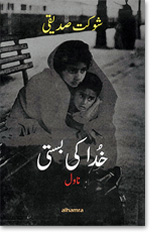
It was a strange feeling. I had just started reading one of the greatest Urdu novels ever written, 'Khuda ki Basti' and finished a few chapters of it but the next morning I got the news that Shaukat Siddiqui, the author, had passed away in Pakistan.
I had always heard names of three great post-partition novels 'Aag ka Daryaa' by Qurratul Ain Hyder, Udas Naslein by Abdullah Husain and Shaukat Siddiqui's Khuda ki Basti, ever since my childhood.
Hyder's Aag ka Darya was readily available and I also got its English transliteration 'River of Fire', in order to lend it to friends.
I could not find Udaas Naslen but I bought its translation that was published in India a couple of years back under the title 'Weary Generations' I got from Hazratganj [Lucknow].
The third novel Khuda ki Basti [The Blessed City/God's Own Land] eluded me for long. All efforts to get it were in vain for years.
A library where I found it in index, had refused to lend it to me as it was in two volumes and the first part had been missing. Recently they somehow got the first volume and hence I issued the whole book comprising two volumes.
I had not read Shaukat Siddiqui, though he belonged to Lucknow, my birthplace. An Urdu novel that has seen over 50 editions would surely have some unique quality, I knew, but I regret that I could read it so late. It is a very dark novel and while reading it, I, for once, had to review my opinion about the critics of Qurratul Ain Hyder.
Yes, I staunchly felt that those who termed Hyder as a 'bourgeoise writer' and charge her of 'writing for the upper/upper-middle class and romanticising the past', were nothing but a frustrated lot. But as I read Shaukat Siddiqui's masterful story, I could see the real Lucknow, the real Lahore and the real Karachi.
The life of ordinary people in the aftermath of partition, the large number of real people who suffered and who are always on the brink--trying their best to prevail upon their misfortune but whose every effort is thwarted.
The dreams of the teenaged boys and street kids and their language could never have been written by somebody else with such perfection. Siddiqui never returned to Lucknow but his portrayal of the life of the City's [Lahore-Karachi have the reflection of Lucknow also in the novel] poor and under-privileged class is unmatched [and scary].
The story of teenaged Sultana, whose dreams die young and poverty forces her mother to ask her to elope with a suitor but even he doesn't turn up and her mother has to marry the person who had his eye on the daughter.
Sultana's brother who works at a mechanic's workshop is fired. He runs away but lands up in a juvenile home from where he goes to a pickpocket's school. One of his friend, who earned a few paisas by pushing the cart of a leper beggar also has a tragic fate.
Other characters of the novel including Sultana's younger brother and her suitor also struggle to survive. Though the noel is terribly gloomy but the characters keep you spellbound. In their struggle for survival, some characters find peace though it is short-lived.
However, Shaukat Siddiqui has succeeded in writing an exceptional novel that looks like an insider's account of the world where the word 'people' doesn't mean just the businessmen, politicians and bureaucrats or the occasional teacher.
Rather, they are eunuchs, thieves, sodomites, catamites, pickpockets, beggars, streetchildren, activists, zealots, mechanics, junk-dealers and so many others move along side you, forcefully making their presence felt and capturing your imagination.
And once again, the novel speaks their language and lives their hopes and failures, not the author's. It's tragic, yes. It's gloomy, yes but you need to read it. It's damn good! Wish to read more of his works soon.
For news about his demise. Click. As far the novel is concerned, it's a must-read book that will leave a strong impression on you. It will help us understand human suffering, the extent of exploitation of the poor children, particularly, the street urchins, and in process help us become more evolved and more sensitive persons.
























